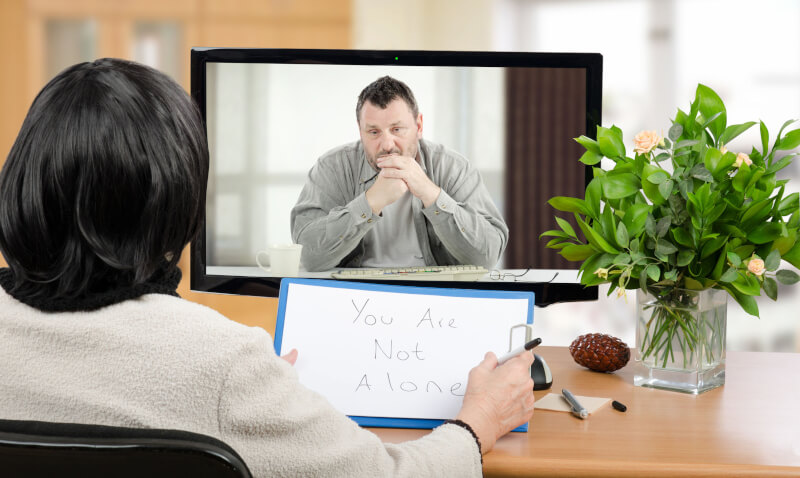Is virtual counselling something you’re thinking about? The internet has made it easier to access mental health care, but you should weigh the benefits and drawbacks of this approach before deciding whether or not it will work for you.
How does Online Counseling Work?
When talking about counselling or psychotherapy, the term “online therapy” is commonly used to describe sessions that take place entirely online. Online therapy is an alternative to traditional face-to-face therapy in which you can communicate with a trained professional from the comfort of your own home using any internet-connected device (computer, tablet, or smartphone). This type of therapy is commonly referred to as teletherapy or e-therapy as well.
Online Therapy Has Several Advantages
People choose online counselling over in-person sessions for a variety of reasons. Consider some of the following benefits of talking to a therapist online. A recent study suggests that online therapy could be as effective as traditional methods. Several types of mental health issues have been shown to respond just as well to online counselling as they do to in-person sessions.
One meta-analysis indicated that cognitive behavioural therapy (CBT) delivered online was just as efficient as a face-to-face treatment for mild depression as either option.
When compared to in-person CBT, another review indicated that cyber-based CBT was just as effective in treating panic disorder, social anxiety disorder, and generalised anxiety disorder. Even in the case of problematic gambling, evidence suggests that virtual treatment can help.
The Best Choice for Outlying Regions
People living in rural or outlying places now have a choice of mental health treatment options thanks to online counselling. There may be no other options for people in remote locations to receive mental health care due to a lack of local mental health clinics.
In-person therapy can be beneficial, but it can be a hassle for those in need to have to travel across town and take time away from their hectic schedule to participate. If you have access to the internet and a therapist who is willing to work with you remotely, online therapy can be a convenient and rapid way to get the help you need.
Physically Handicapped People’s Availability
People who are physically unable to leave their homes can benefit from online counselling because of this. Mental health care might be difficult to reach for people with mobility issues. It’s possible that a therapist’s home office isn’t equipped to handle clients with a wide range of mobility and sensory impairments. Online therapy can be a helpful substitute for typical in-person psychotherapy settings for those who are unable to leave the house for different explanations, such as mental or physical sickness.
Time
It might be difficult to carve out “me time” in our busy schedules. It’s possible that your schedule is hectic and your hours are unpredictable. Maybe you have to rush around all the time because you’re a single parent or a caretaker. In online therapy, you can talk to your therapist at any time that is convenient for you, whether it be a fast video conference before you leave for work or a convenient live messenger conversation after you’ve put the kids to bed. We must check on our mental health regularly. And a little therapy session after supper or before our night shift might make a world of difference.
Advantages of Ease and Low Cost
It’s common for online counselling to be both low-cost and easy to schedule. Since online counselling may be done at any time and from any location, you can arrange your sessions around your busy schedule. Many jurisdictions now mandate that insurers treat online counselling the same as they would in-person sessions. To find out if and how your policy covers e-therapy sessions, contact your insurance provider. Online-only therapists handle patients without the need for expensive office space. Consequently, online therapists can frequently provide low-cost therapy options for people without health insurance.
Comforts of Home
In all honesty, it can be challenging to share our innermost thoughts and emotions with others. It’s been a real challenge. However, it’s often the tiniest conveniences that prove most helpful. There are those among us who are more likely to share our deepest thoughts and feelings in an online forum than in person. It could make the task seem easier. Another option is to put on a pair of night slippers and relax on the couch with them.
Treatment May Be Less Isolating
Getting help for mental health issues is now easier to do thanks to the internet.7 Although it’s common for people to confide in their loved ones about physical health challenges, they often keep silent about mental health issues, despite their significance. The prejudice that has long been connected to talking about mental health has been aided by the widespread availability of online resources.
Teletherapy has the potential to be a useful resource for educating people about mental health. Even if you already feel mentally healthy, you may benefit from engaging in online therapy. Better mental health is attainable with increased knowledge of preventative practices and resiliency mechanisms. Online therapy may serve as a convenient entry point for those who could benefit from speaking to a therapist but do not yet have a clinical diagnosis.
According to Medical Review, there are loads of advantages of opting for private counselling sessions with a therapist:
Downsides of Online Counseling

While there are cases in which online therapy could be highly beneficial, it does have significant drawbacks compared to more conventional forms of treatment.
Some Insurers Might Not Pay for It
Wherever you live and what kind of insurance you have can affect whether or not you pay out of pocket for e-therapy. As well as the fact that not all insurers cover mental health services, it might be difficult to find online professionals in the field who take medical aid as payment. The cost of private psychotherapy sessions can soon pile up.
Finding the Right Therapist May Take Some Time
You might not get to select your initial therapist on an online counselling site. Our reviews team found that 57% of online treatment users were assigned a therapist rather than having the option to select one. To match you with the most suitable therapist, a questionnaire is often used by online counselling services. Although you’re free to change therapists at any time without penalty, you may need a few visits to get to know different candidates before settling on one with whom you feel comfortable working.
Privacy, Secrecy, and Unreliable Technology
Protecting your privacy is always a top priority in psychotherapy, but it becomes even more convoluted when you bring in the additional dimension of receiving treatment online. Keeping client information private is essential in any kind of therapy, including internet counselling. Since communication is taking place via the internet, the potential for security breaches is increased. Accessing care when it’s most needed can be challenging because of technology issues.
A Failure to Provide Real-time Assistance to Customers
When dealing with customer service concerns, some online counselling services require users to send an email or fill out a contact form. The wait time can be annoying if you require an immediate answer.
In Conclusion
Persons in need of mental health care who are unable to travel to a clinic because of their location, physical limitations, or busy schedules may find help through internet therapy. It may make the process of getting aid easier and more pleasant, and it doesn’t cost very much. While some people may benefit from online therapy, it’s important to remember that not all insurance providers cover it and that it may take some time to find the proper therapist. Your decision to engage in online therapy ought to be informed by careful consideration of the advantages and disadvantages of this method, as well as your individual goals and circumstances. Once you have determined all of the above, click here to book your counselling sessions.




